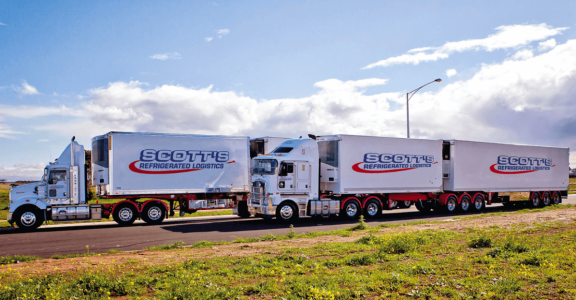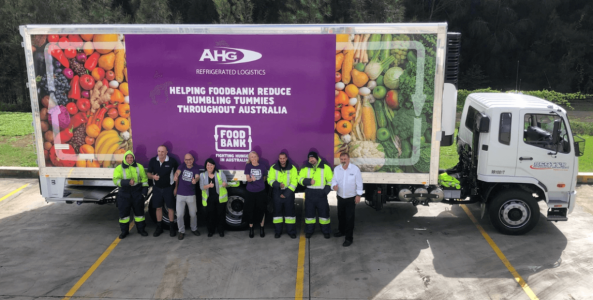Liquidation of a major Australian trucking firm puts $500 million worth of frozen goods at risk
- Replies 21
Last week's news shook the logistics industry as one of the nation's top trucking companies, Scott's Refrigerated Logistics, came to a chilling halt.
Despite servicing major supermarkets nationwide, the company was unable to escape its mounting debt and was plunged into receivership. The shocking turn of events unfolded after the company was acquired by Anchorage Capital Partners, a private equity firm, for a staggering $75 million in June 2020.
With over 1,500 employees now out of a job, and the firm's 500 trucks and 1,000 trailers at risk of being sold, the future of this once-thriving logistics giant remains uncertain.
Now, the Sydney-based company is facing the daunting task of relocating 114,000 pallets of frozen food from its 24 warehouses. The costly leases on these warehouses have burdened the company, leaving them struggling to find suitable locations to house their inventory.

But what does this mean for us shoppers?
The situation is dire, as the liquidation could lead to massive supply shortages across Woolworths, Coles, ALDI, IGA, and even Foodbank Australia. With approximately half a billion dollars worth of frozen goods at stake, the possibility of them going to waste is a serious concern.
This could mean discounted goods in the short term as retailers race to get through the stockpiled food, but may ultimately result in higher prices for frozen goods and other products further along the supply chain, causing a ripple effect in the market.
The consequences of Scott's Refrigerated Logistics' liquidation are far-reaching and believe it or not, could affect the shopping habits and budgets of hundreds of thousands of Aussie consumers.
Investment and consulting firm KordaMentha is attempting to move the goods and has contacted landlords, customers and other supermarkets to relocate the stock.
Voluntary administrator McGrathNicol noted that while KordaMentha was working with customers to move the stock, there simply wasn't enough storage capacity to do this in a timely fashion.

According to Marianne Kintzel, the executive officer of the Refrigerated Warehouse and Transport Association, the speed of the liquidation has made it difficult for the market to absorb the loss of 750 trucks and 200,000 pallet spaces within a week. She suggested that a more planned rundown would have helped with supply chain stability and reduced waste.
She also expressed concern that there is not enough warehouse capacity elsewhere to cover the loss of Scott's, which was one of the biggest transporters in the market.
However, Ms Kintzel noted that other cold-chain companies are stepping up to fill the gap, and making 'thousands of phone calls'. Nevertheless, the industry is grappling with a host of issues, including labour shortages, rising costs of fuel, insurance, tolls, and energy.
One of the biggest costs for the industry is building and maintaining refrigerated warehouses, with some facilities paying up to half a million dollars per month in energy costs alone. The competitive nature of the industry means that margins are already tight, leaving companies with little room to manoeuvre when costs rise.

The news of Scott's Refrigerated Logistics folding has created valid concerns about the fate of millions of dollars worth of perfectly edible goods that may go to waste and not reach those who need them the most.
Fortunately, supermarkets are taking steps to ensure that the liquidation of Scott's Refrigerated Logistics does not compromise supply. Both ALDI and Coles have made contingency plans to safeguard the supply of goods for their customers.
An ALDI spokesperson stated that the company has worked with its existing logistics partners to ensure the transition of the 3% of Scott's business that it managed to other logistics partners. They also emphasised their commitment to minimising the impact on customers with regard to product availability and continuity of product collection from valued supplier partners.
Similarly, Coles has removed all of its stock from the Scott's storage facilities and transferred its services to other transport partners. Coles also confirmed that it is working with suppliers who had previously managed their deliveries directly with Scott's, to help them quickly secure new options to continue deliveries to major supermarkets.
The supermarkets' focus remains on the continued availability of refrigerated products in stores and online for customers. They are closely monitoring deliveries across their supply chains and working hard to minimise disruptions for customers, farmers, and suppliers.
As of writing, Foodbank Australia, Woolworths and IGA have not yet given a statement regarding the impact of Scott's Refrigerated Logistics' liquidation on their supply chain.

Members, this just goes to show that the days of product shortages are, sadly, far from over. We’ll keep you updated, but expect to see shortages of frozen goods in major supermarkets and food banks across Australia.
As we brace ourselves for the possibility of price hikes in frozen goods, let's keep a watchful eye on how this situation will unfold.
What are your thoughts on this? Do you have any suggestions or ideas to mitigate the impact on consumers and the industry? Share your insights in the comments below!
Despite servicing major supermarkets nationwide, the company was unable to escape its mounting debt and was plunged into receivership. The shocking turn of events unfolded after the company was acquired by Anchorage Capital Partners, a private equity firm, for a staggering $75 million in June 2020.
With over 1,500 employees now out of a job, and the firm's 500 trucks and 1,000 trailers at risk of being sold, the future of this once-thriving logistics giant remains uncertain.
Now, the Sydney-based company is facing the daunting task of relocating 114,000 pallets of frozen food from its 24 warehouses. The costly leases on these warehouses have burdened the company, leaving them struggling to find suitable locations to house their inventory.

In a shock announcement last Monday, one of Australia's largest cold-chain logistics operators, Scott's Refrigerated Logistics, went into receivership. Credit: Facebook.
But what does this mean for us shoppers?
The situation is dire, as the liquidation could lead to massive supply shortages across Woolworths, Coles, ALDI, IGA, and even Foodbank Australia. With approximately half a billion dollars worth of frozen goods at stake, the possibility of them going to waste is a serious concern.
This could mean discounted goods in the short term as retailers race to get through the stockpiled food, but may ultimately result in higher prices for frozen goods and other products further along the supply chain, causing a ripple effect in the market.
The consequences of Scott's Refrigerated Logistics' liquidation are far-reaching and believe it or not, could affect the shopping habits and budgets of hundreds of thousands of Aussie consumers.
Investment and consulting firm KordaMentha is attempting to move the goods and has contacted landlords, customers and other supermarkets to relocate the stock.
Voluntary administrator McGrathNicol noted that while KordaMentha was working with customers to move the stock, there simply wasn't enough storage capacity to do this in a timely fashion.

The Refrigerated Warehouse and Transport Association says there is not enough capacity for warehouses elsewhere to take the food. Credit: Unsplash/CHUTTERSNAP.
According to Marianne Kintzel, the executive officer of the Refrigerated Warehouse and Transport Association, the speed of the liquidation has made it difficult for the market to absorb the loss of 750 trucks and 200,000 pallet spaces within a week. She suggested that a more planned rundown would have helped with supply chain stability and reduced waste.
She also expressed concern that there is not enough warehouse capacity elsewhere to cover the loss of Scott's, which was one of the biggest transporters in the market.
However, Ms Kintzel noted that other cold-chain companies are stepping up to fill the gap, and making 'thousands of phone calls'. Nevertheless, the industry is grappling with a host of issues, including labour shortages, rising costs of fuel, insurance, tolls, and energy.
One of the biggest costs for the industry is building and maintaining refrigerated warehouses, with some facilities paying up to half a million dollars per month in energy costs alone. The competitive nature of the industry means that margins are already tight, leaving companies with little room to manoeuvre when costs rise.

The trucking firm is in partnership with Foodbank Australia, providing long-haul temperature-controlled transport and storage across the country. Credit: Facebook.
The news of Scott's Refrigerated Logistics folding has created valid concerns about the fate of millions of dollars worth of perfectly edible goods that may go to waste and not reach those who need them the most.
Fortunately, supermarkets are taking steps to ensure that the liquidation of Scott's Refrigerated Logistics does not compromise supply. Both ALDI and Coles have made contingency plans to safeguard the supply of goods for their customers.
An ALDI spokesperson stated that the company has worked with its existing logistics partners to ensure the transition of the 3% of Scott's business that it managed to other logistics partners. They also emphasised their commitment to minimising the impact on customers with regard to product availability and continuity of product collection from valued supplier partners.
Similarly, Coles has removed all of its stock from the Scott's storage facilities and transferred its services to other transport partners. Coles also confirmed that it is working with suppliers who had previously managed their deliveries directly with Scott's, to help them quickly secure new options to continue deliveries to major supermarkets.
The supermarkets' focus remains on the continued availability of refrigerated products in stores and online for customers. They are closely monitoring deliveries across their supply chains and working hard to minimise disruptions for customers, farmers, and suppliers.
As of writing, Foodbank Australia, Woolworths and IGA have not yet given a statement regarding the impact of Scott's Refrigerated Logistics' liquidation on their supply chain.
Key Takeaways
- Australia's largest cold-chain logistics operator Scott's Refrigerated Logistics went into receivership last Monday.
- Fears have been raised that the frozen food could go to waste, leading to supply shortages across Woolworths, Coles, ALDI, IGA and even Foodbank Australia.
- Fortunately, supermarkets are taking steps to ensure that the liquidation of Scott's Refrigerated Logistics does not compromise their supply.
- The impact of these challenges on the industry and consumers remains to be seen.
Members, this just goes to show that the days of product shortages are, sadly, far from over. We’ll keep you updated, but expect to see shortages of frozen goods in major supermarkets and food banks across Australia.
As we brace ourselves for the possibility of price hikes in frozen goods, let's keep a watchful eye on how this situation will unfold.
What are your thoughts on this? Do you have any suggestions or ideas to mitigate the impact on consumers and the industry? Share your insights in the comments below!







